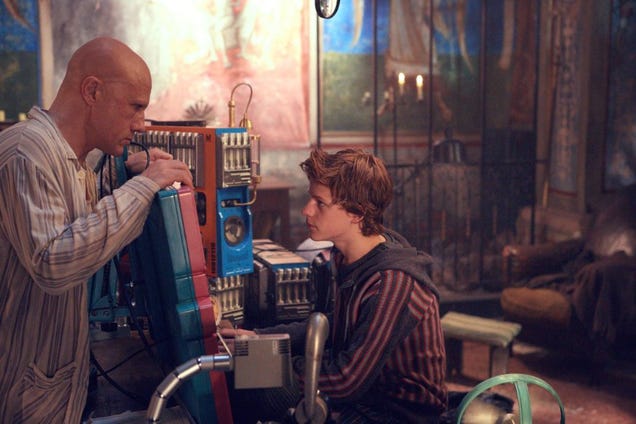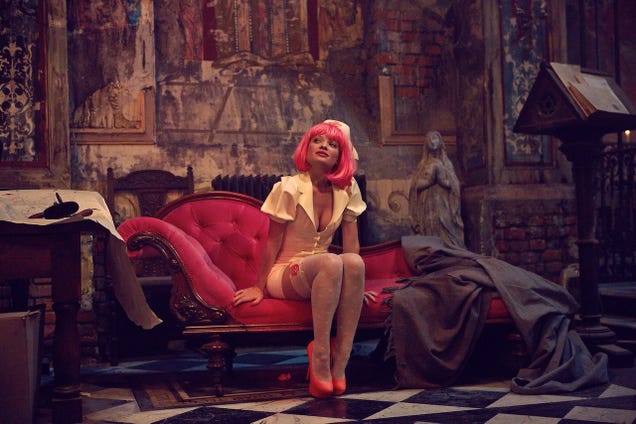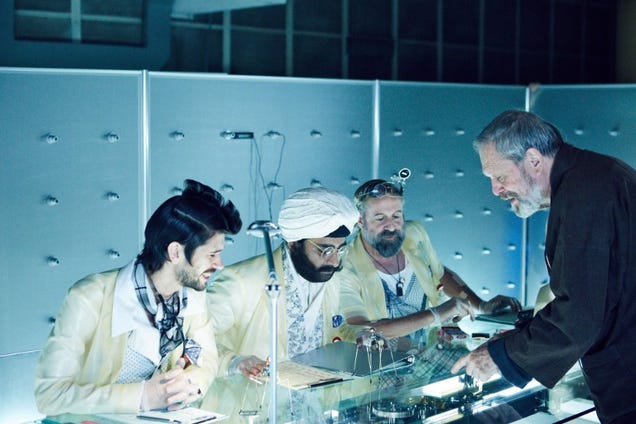In this interview posted at Space io9, Gilliam talks about the new film, films that shaped him, and what he things about 12 Monkeys becoming a television series, among other topics.
Terry Gilliam Talks About The Message Of Zero Theorem: "Wake Up!"
Mika McKinnon
We caught up with Terry Gilliam recently to talk about his new film, Zero Theorem, a one size fits all, full gate, semi-vinyl motion picture on searching for the meaning in the face of impotence. He also told us which films left shrapnel in his soul, and why you should be fucking honest and cut the end off your story.
I was braced to forcefully interject questions in a mob of loud, rude journalists, but instead we were so dazed in our pre-coffee state that Gilliam teased that our gathering was a pajama party without the pajamas, all of us sleepy, quiet, and far too polite. He waded into the scrum of journalists with good humour, poking fun at himself, the world around him, and all of us huddled indoors so early on a Saturday morning while everyone else was outside gawking at Dragon Con's costume parade. We in offered him rambling, unfocused questions that have been paraphrased for clarity in this transcription, while keeping his sharply clever responses intact verbatim.

What is Zero Theorem about?
I never define depression, clinical or otherwise. It's the basis of most life. It seems to be the modern world: we all are depressed.
In a sense, [the movie is about] a guy who felt if only he had meaning for his life, it'd be okay. He's so busy waiting for someone to tell him rather than finding it himself or living it. I find the character [of Qohen] interesting because he's been so damaged by life in advance of the time we get to know him. To me, the real heart [of the movie] was him trying to reclaim his humanity, his ability to care, to love, and actually get outside of himself.
The world around it is my invention. That's just fun; it's a beautiful place.
The most important decision to me, and the most dooming thing, is when Bainsley says "Come away with me," and he can't do it! And yet, even after that the boy brings some paternal instinct out. He cares about him. And even that's taken away. Impotence is the heart of it.
Those of us who pay attention to the world [we live in], who read the news, feel we can do something about it. Then you realize how impotent you are to change things. And that's the sad thing. I talk about all these other things, but that's the heart of [the movie]. I created the world around him, but that's not really the movie, that's the stuff around it.
Some people get it immediately: some people identify or feel something for Qohen, understand where he is. Other people are just confused by it. [When looking at ratings for the film], fives are great and zeros are great, the middle is very vague and I like that because I know [they're] experiencing something. That's all I've tried to do — leave bits of shrapnel in them like I've had bits of shrapnel left in me from other films. We entertain as best we can, but we also try to reach people.

What is it about the meeting of reality and fantasy that fascinates you, and how does it play out in Zero Theorem?
Reality and fantasy — we need both of those to survive. If we don't have fantasy and dreams and all of those things, what's the point of carrying on? You need to watch out for reality because a buses come when you cross the street; be careful!
All those things are necessary, and I find so often they're split into two different categories. "Oh, we're doing a fantasy film. Oh, we're doing a realistic film." I try to mix the two because I find the battle or the bounds between the two aspects is what makes life interesting.
I never thought necessarily that I do fantasy because I always thought I'm actually dealing l with reality, it just happens to be through the eyes of a cartoonist. I'm a cartoonist; that's what I am at heart. In cartoons, you take reality and deform it, you make it grotesque, you make it funny. You alter it, but it works because it's based upon reality. That's what I try to do.
Zero Theorem is really a kind of satirical version of the world we're living in. It's just a little aspect of the world that has to do with the connected world we live in, or those who chose not to be connected to that world.
[We were in] this beautiful Georgian house, all designed to be almost in the 18th century. It was quiet, it was peaceful. We'd been there for a few hours, and we opened the door and outside was light and noise! In Zero Theorem, it's the shock of the world if you allow yourself to disconnect, and to forget it's out there, how noisy it is, how busy it is, how invasive it is. I was playing with all those things and basically the fact that I've been intrigued for so long about trying to disconnect from the connected world.
Within the movie, why do people want to solve the Zero Theorem?
People do. It's why people want to understand the meaning of life, or in the case of Mancon, if you can prove that everything is nothing, that's really important information! That's what advertising feeds on. Advertising feeds on your incomplete life, your frustrations, your dreams are never fulfilled! The more incomplete you are, the more things we can get you to buy! It's just good business. I don't really know what Mancon's up to except, "Get a lot of information together, and then we can start controlling people."
It's an interesting thing: when we first started showing the film, people would call it a dystopia. I don't think it's a dystopia. I think it's the world that's out there in colourful clothes having a good time shopping! Com'on, let's go! There's only one miserable guy in the whole thing, everyone else is having a fine time out there in a utopia!
They thought it was about big government again, about power of the state, is what Mancon was. No, it's not about governments anymore, it's about corporations! That's why it's "Corporations Sans Frontières." Who's really running the world, folks? Wake up! The government is just doing the show. You think that living in a democracy means that we have control. It's a corporate world we're living in, folks! Lack of control. I love my iPhone!
The format of the film is unusual in size and with rounded corners. Why?
That's why we call it a one size fits all, full gate, semi-vinyl motion picture. (Please write that down!)
In my perverseness, we shot it [so] the proportions are 16:9, not 1.85:1, or 2.39:1. It's what you see on your television screen now, and so it's "one size fits all." I thought since people are going to watch it anyway on their phones and their iPads and all, I want them to see exactly the same thing as you see in the cinema. So that's it. No cropping when you get to the tv format or anything.
"Full gate" is because it is. What you see is the full gate in the camera, and it has the little rounded edges because that's what is! Within most films — all films — there's a safety area inside which how normally you see the whole film. We went for the whole thing, so you see the full gate. If there were hairs in the gate, you would see them. There are hairs in the gate, and a little funny scratch down one side! The last time people had seen that was in silent movies, because subsequently we don't show that. So, I thought that was more fun as well.
It's "vinyl" because [the movie is] analogue and shot on film. However, there were 216 digital effects shots, so I couldn't lie and say it was "full" vinyl. So, it's semi-vinyl.
It was interesting — the rounded corners [caused] huge problems because the producers and even some of the quality-control guys for the distributers were saying, "No, we won't accept this. This is wrong! It's rounded corners!" What happens in 16:9 is little black strips down the sides because we don't go full width. But how many times have you gone to the cinema and seen the side curtains pulled, and half the film on the side curtains? It doesn't matter!
But there were all these people who were frightened by this new idea, and were resisting it! So I had to write a letter saying, "This is my creative choice. It was a creative decision, and blah blah blah." [Now the film is released], no one has ever complained, but you had to go through this gauntlet of people who are hired to make sure that no one complains!
Which films have left bits of shrapnel in you?
I remember as a kid, Thief of Bagdad, the great Korda and Powell film, the scene where the kid is in the big spiderweb and the spider is coming out... That I used to wake up in the middle of the night trapped in that spiderweb, all my bedclothes wrapped around me, strangling me. That's a kind of shrapnel.
The one that sort of woke me up to the power of movie-making and ideas is Paths of Glory. I'd never seen such injustice on the big film. It was the first time I was aware of the camera, the tracking shots shooting the trenches. It woke me up.
That's the kind of thing I'm talking about: things that stick with me, and inform the way I see the world.
There was a lawyer who saw Brazil. He didn't know what happened. He went back to his office, and locked himself in for three days. There is this publicist from Universal. She said when she saw the film, she went back home, and was taking a shower, and just started weeping and couldn't stop. Dave Crosby, of Crosby, Stills, and Nash, he had been in an accident the year before, and his wife died. He couldn't come to terms with it. He saw The Fisher King, and like Robin [Williams], at the end there's a catharsis, and said he could live again. Now, that's interesting, when a film does that for someone. There's a woman who saw the film lived in New York, and afterwards, walked home 20 blocks, then realized she'd walked 20 blocks in the wrong direction.
That's what so many films have done for me, and that's what I am trying to do. When that works, you feel you pulled something off here that's worth it. Hopefully it's attitudes or ideas or views of the world that are different than the straight, mainstream road.
What have you watched recently that you really like?
Not much.
If Brazil, Twelve Monkeys, and Zero Theorem are a triptych of dystopia, are you finished exploring that type of world?
I'm not the one that said that!
I don't even think I'm dealing with dystopias. It's just versions of what I see the world is now. Brazil was about then; it just happens to be that now is even more like Brazil than the world was then! I do take full responsibility for the creation of Homeland Security.
[Zero Theorem] is really about now. Because the film takes place almost entirely inside this church, my only moment to deal with what I thought was now was out on the streets the few times we get out there. Just the overload of images and stuff is out there! It's my chance to nail advertisers. We turn Occupy Wall Street into Occupy Mall Street: Shoppers of the world unite! That's the side I get to be more satirical, then inside is this other story that's hopefully interesting.
How do you feel Twelve Monkeys will translate into a television series?
I no idea! I don't have a fucking clue! No one even contacted me. My producer never even contacted me to say we're going to do this. I never heard anything other than what I read in the press. But I do think Jeffrey — Brad Pitt's character — being a woman is such a major breakthrough that I think that's why it's going to work.
...I have no idea. What they've got is basically a time-travel movie. It won't have much to do with the film. But my ex-agent was quite impressed by the lack of decency or politeness on the part of those who are going to make money off it.
How do you interpret Chrétien de Troyes' Perceval myth, the basis of The Fisher King?
The chief thing with Perceval is that here is this young, bright guy. He actually gets to where he's supposed to go, but doesn't ask the right question. He then spends the rest of his life trying to get to where he already had got to. It's asking questions rather than accepting things. In Perceval's case, he's polite. That's his great sin: he's polite and doesn't ask the right question! Don't be polite!
Right now, we live in a world where everyone is terrified of offending. Fuck that! Offence is important, folks! I mean, if we'd have behaved like that, there wouldn't have been Monty Python. We went out of our way to offend and to shock people. It's not to offend in a cheap way. Don't do cheap racial jokes or ethnic jokes. Some are really funny, but just too many are just too easy. But a good one? Wow, that's good! It's like when we were in college, we did practical jokes. The joker had to put more effort in than what the jokee had to go through. It's about that, and trying to get people to think.
That's all I'm really saying. Some of that is shocking them, saying rude things. When my daughter says, "That's rude!" [I say,] "I am? Am I causing harm, or am I doing or saying something someone might react to and start thinking about things?" I think that's it. I'm don't know if that's exactly the way Chrétien de Troyes meant his Perceval, but that's my translation!
But I do think we're frightened of saying things: it might be the wrong thing and cause offence. Enough people aren't being honest. They're not speaking honestly. They're speaking with all sorts of self-censorship going on. Writers will be self-censoring before it even gets to studio executives, because they know a film won't get through that gauntlet. Because they want to get their films made, they censor it.
When I first read Richard [LaGravenese]'s script [for The Fisher King], I thought it was fantastic, except there were certain elements in there that I just didn't buy. They were stupid. I started talking to him, and he said well, he's under pressure from producers to do these things so it's more likely the film gets financed. And I said, "Rich, let me see your first script." We went basically from that because it was there, it was pure, it was honest.
To bring Perceval into the Zero Theorem, the ending of Zero Theorem was not in the script. There were three scenes that follow that moment. The ending that was in the script was a crap Hollywood ending. It just violated the world we created, but it was there because obviously the producers thought we'd get it funded more easily. Now, when I cut the film together, I just couldn't stand that. I just [went] chop, chop, chop off, and left it where it was. Pat Rushin, who wrote it, said, "Thank you for that."
Again, it's how you want to succeed, you want to achieve and get your work done, and you make these little compromises all the way. By the end, you've violated what you set out to do. It's a very hard balance, how to play this game and get films made because they're expensive. With most of the work, it's is self-censorship by the writer is where the problem begins. I wish... I don't know how to get around it, frankly, besides do what we did: film a happy ending, but cut it off.
The Zero Theorem will be in U.S. theaters this Friday.





No comments:
Post a Comment